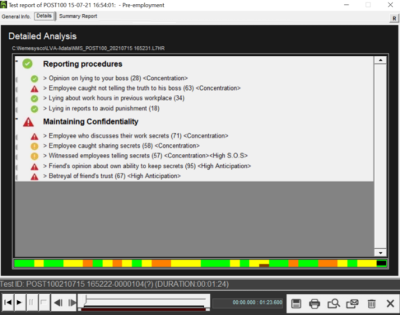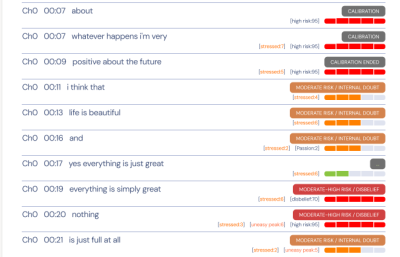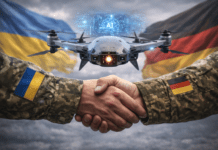This post is also available in:
 עברית (Hebrew)
עברית (Hebrew)
Many industries nowadays want the ability to take the audio of a conversation and know the true feelings and hidden intentions of the speaker, whether it is for security purposes in investigations, identifying true intentions during job interviews, streamlining customer service work, or saving lives in emergency call centers.
To provide a solution to these needs, Amir Lieberman, software developer, founder, and CEO of Nemesysco, developed the “Layered Voice Analysis” algorithm (also called LVA) that can take a voice recording and extract the speaker’s most hidden emotions from it, regardless of language, intonation, personality, culture, gender, or age. The system processes the recording and extracts a wide range of biomarkers that cannot be controlled by the speaker or heard by human ears. The system can then relate these biomarkers to different human emotions, including excitement, insecurity, mental effort, level of aggression, sadness, joy, expectation, irritation, arousal, and more.
Until the LVA algorithm was developed, there have been attempts to provide a similar service, which were unsuccessful due to using other vocal parameters that were not in modern microphones’ sampling range. Other methods tried basing themselves on the words being said, but those were deceptive and unreliable. For example, if a person says angry words in an angry tone, other algorithms may recognize “anger”, while the LVA algorithm will not recognize the emotion that the speaker is presenting, but rather their true emotions and feelings, regardless of the content of the words or tone.
The algorithm was initially used for security purposes. Established in 2000 for quick detection of terrorists at border crossings, it was quickly found to be very effective in recognizing emotions – leading the company to redirect its technology to other security uses in what is now the company Nemesysco. The technology is used in the security world primarily for interrogations, understanding intentions, and subtext. For example, if a person says in a recording that he will “bring the lipstick to the wedding,” is that his true intention, or is that code for malicious intent?

The service Nemesysco provides is performed on the end device that runs the analysis (like a computer) and keeps the data secured. The system provides a large amount of data about the speaker’s emotions, and the interpretation is up to the expert processing the results, who has learned to work with the system in advance and has close knowledge of the relevant field and its needs.
This technology is currently being used in over 50 countries, mainly for interrogations, spy detection, personnel interviews for senior positions, and “time bombs” for which there is an urgent need to know how a person feels and whether the information they provide is correct. These conclusions can affect urgent decisions in the field, like whether to send in a task force or whether to stay back in fear of a trap.
Alongside the use in the security sector, the founders of the company understood that once there is a system for experts, it is possible to build an automated system for commercial and civilian use. The development of artificial intelligence technology brought with it the commercial use of the LVA algorithm – combining the popular capabilities of advanced language learning models (such as ChatGPT) with the deep emotional understanding of the LVA algorithm created Nemesysco’s civilian version – Emotion Logic.
Emotion Logic’s tool makes these capabilities accessible to a non-expert user. It takes a call and extracts what is said using a speech-to-text engine, extracts the speaker’s true feelings using the LVA algorithm, and enters all the data into a large language model. Here the user tells the AI what “lens” it should look through at the given information, what to focus on according to the specific need and commercial use, and then provides the final analysis.

This technology has potential uses in sales or customer service centers (helping identify a customer’s level of satisfaction), personality tests for job interviews (identifying personal characteristics and understanding the person underneath their surface-level presentation), as well as emergency hotlines and call centers (the ability to identify and flag calls in which the speaker is in high distress so they won’t fall through the cracks).
Both companies graduated the INNOFENSE Innovation Centre operated by iHLS in collaboration with IMoD. A unique acceleration program that removes entrance barriers to the technological ecosystem turning startups into mature, leading companies while connecting them with relevant investors, which is designed to strengthen the links between the civilian and defense markets via the collaborative development of the technologies, thus advancing and improving their integration in both markets.
For additional information, contact [email protected]


























